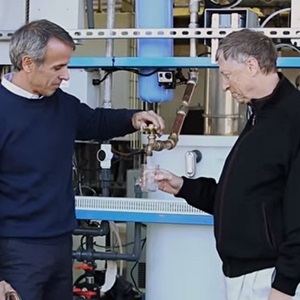
Thinking about drinking water from the toilet may leave a bitter taste in your mouth, but not for philanthropist Bill Gates.
He drank water distilled from human faeces and he is not worried about falling ill, despite the fact that drinking contaminated water can result in serious illness, including diarrheal disease.
"The water tasted as good as any I've had out of a bottle. And having studied the engineering behind it, I would happily drink it every day. It's that safe," the billionaire wrote in a blog post.
So why is this poo water safe to drink? A new machine, called the Omniprocessor, burns human waste to produce electricity and water.
"I watched the piles of faeces go up the conveyer belt and drop into a large bin. They made their way through the machine, getting boiled and treated. A few minutes later I took a long taste of the end result: a glass of delicious drinking water," wrote Gates.
He said the ingenious machine runs at such a high temperature of 1000 degrees Celsius that there is no nasty smell and it also meets all the emissions standards set by the US government.
The Omniprocessor is designed and built by Janicki Bioenergy and forms part a project by the Gates Foundation aiming to improve sanitation in poor countries.
Watch this video about how the Omniprocessor works:
Peter Janicki, CEO of Janicki Bioenergy, explained that sludge enters the machine through a conveyer belt and then fed into large tubes called the dryer. This is where the sludge is boiled.
"In the boiling process we seperate the water vapour from the solids. The solids are now dry and we can feed them into the fire. Once we have this very hot fire we can make high pressure high temperature steam."
This steam is then sent to a steam engine, which drives a generator that makes electricity that is used for the processor. Janicki said that excess electricity can be delivered back to the community.
"The water vapour that's created in the boiling process is run through a cleaning system until we have the cleanest purest water you can possibly imagine."
From the toilet to the glass
According to the World Health Organisation about 1.8 billion people use a source of drinking water that is contaminated with faecal matter.
Gates pointed out that at least 2 billion people use latrines that aren't properly drained, while others simply defecate out in the open.
"The waste contaminates drinking water for millions of people, with horrific consequences: Diseases caused by poor sanitation kill some 700 000 children every year, and they prevent many more from fully developing mentally and physically.
"If we can develop safe, affordable ways to get rid of human waste, we can prevent many of those deaths and help more children grow up healthy."
Western toilets not a solution
Gates said that Western toilets aren't the answer, because they require a massive infrastructure of sewer lines and treatment plants that just isn't feasible in many poor countries.
This is where the Omniprocessor comes in, which Gates says is a safe repository for human waste.
"Today, in many places without modern sewage systems, truckers take the waste from latrines and dump it into the nearest river or the ocean or at a treatment facility that doesn't actually treat the sewage. Either way, it often ends up in the water supply. If they took it to the Omniprocessor instead, it would be burned safely.
"Through the ingenious use of a steam engine, it produces more than enough energy to burn the next batch of waste. In other words, it powers itself, with electricity to spare," said Gates.
He also added that the next-generation processor will handle waste from 100 000 people, producing up to 86 000 litres of potable water a day and a net 250 kw of electricity.
Turning waste into cash
However, the vision for the Omniprocessor is not to only keep human waste out of the drinking water, but also to turn waste into a commodity.
"Our goal is to make the processors cheap enough that entrepreneurs in low- and middle-income countries will want to invest in them and then start profitable waste-treatment businesses. ... It's the ultimate example of that old expression: one man's trash is another man's treasure."
Although Gates said there is still a lot that needs to be learned before this can happen, a pilot project is on course to be rolled out in Senegal.
Rémi Kaupp, urban sanitation specialist at WaterAid UK, lauded the Omniprocessor saying it could particularly help in urban areas.
"It's a vision for the future where not only everybody has access to sanitation, but faeces also become a cheap and convenient source of fertiliser and energy," he said.
Also read:
Scientist call to test Karoo drinking water before fracking starts
Cancer-causing agent found in US drinking water after pipeline spill
Mystery of where Earth's water came from deepens




 Publications
Publications
 Partners
Partners














